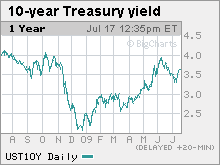Treasurys fall on housing data
Government bond prices decline after a report showed that housing starts rose in June, a positive sign for the staggering housing market.
NEW YORK (Reuters) -- U.S. Treasurys prices fell Friday after the government reported a surprising rise in U.S. housing starts in June, bolstering prospects for economic recovery and dampening demand for safe-haven U.S. government debt.
Bonds were also undermined by speculation that CIT Group Inc. (CIT, Fortune 500), a U.S. lender to hundreds of thousands of small- and medium-sized businesses, may be able to avoid bankruptcy by securing short-term financing.
"Housing is the epicenter of the current crisis, and if the epicenter of the crisis is healing, then the need for the safest asset on the planet does diminish," said David Dietze, chief investment strategist at Point View Financial Services in Summit, New Jersey.
U.S. housing starts rose a bigger-than-expected 3.6%, propelled by a 14.4% rise in single-family home starts, the Commerce Department said. It was the biggest jump in single-family home starts since December 2004.
"Housing starts, without a doubt, are why the market is down," said William Sullivan, chief economist at JVB Group in Boca Raton, Florida. "That's viewed as a healing process in the economy, which in turn reduces the demand for liquidity assets such as Treasury securities."
Benchmark 10-year Treasury notes traded 23/32 lower in price for a yield of 3.66%, up from 3.56% late Thursday. Yields rose through much of the week, climbing from 3.31% late last Friday, with data this week supporting views that the manufacturing sector is stabilizing and the economic decline may be slowing.
An end to the recession would tend to favor riskier investments like stocks and corporate bonds, rather than safe-haven Treasuries.
Indeed, the 30-year bond posted its biggest weekly rise in yields this week in nearly six months. Thirty-year bonds Friday traded 1-20/32 lower in price for a yield of 4.55% from 4.44% late Thursday.
"Earnings are coming in better than expected, there is some nice economic data, and there is some momentum building to the concept that recovery is coming, and that makes the demand for Treasuries diminish," said Point View's Dietze.
Traders and analysts said speculation that CIT Group may be able to avoid bankruptcy also weighed on government debt.
A source close to the company said Friday that CIT was in talks with JPMorgan Chase & Co. (JPM, Fortune 500) and Goldman Sachs Group Inc. (GS, Fortune 500) about short-term financing.
"There is some word now that a private-sector bailout may be engineered, and just the fact that the government does not want to lead the charge to bail (CIT) out suggests that their latest data also suggests that the economy is recovering," Dietze said.
Two-year Treasury notes traded unchanged in price for a yield of 1.00%, while five-year Treasury notes lost 10/32 in price, with their yields rising to 2.51% from 2.44% late Thursday. ![]()



